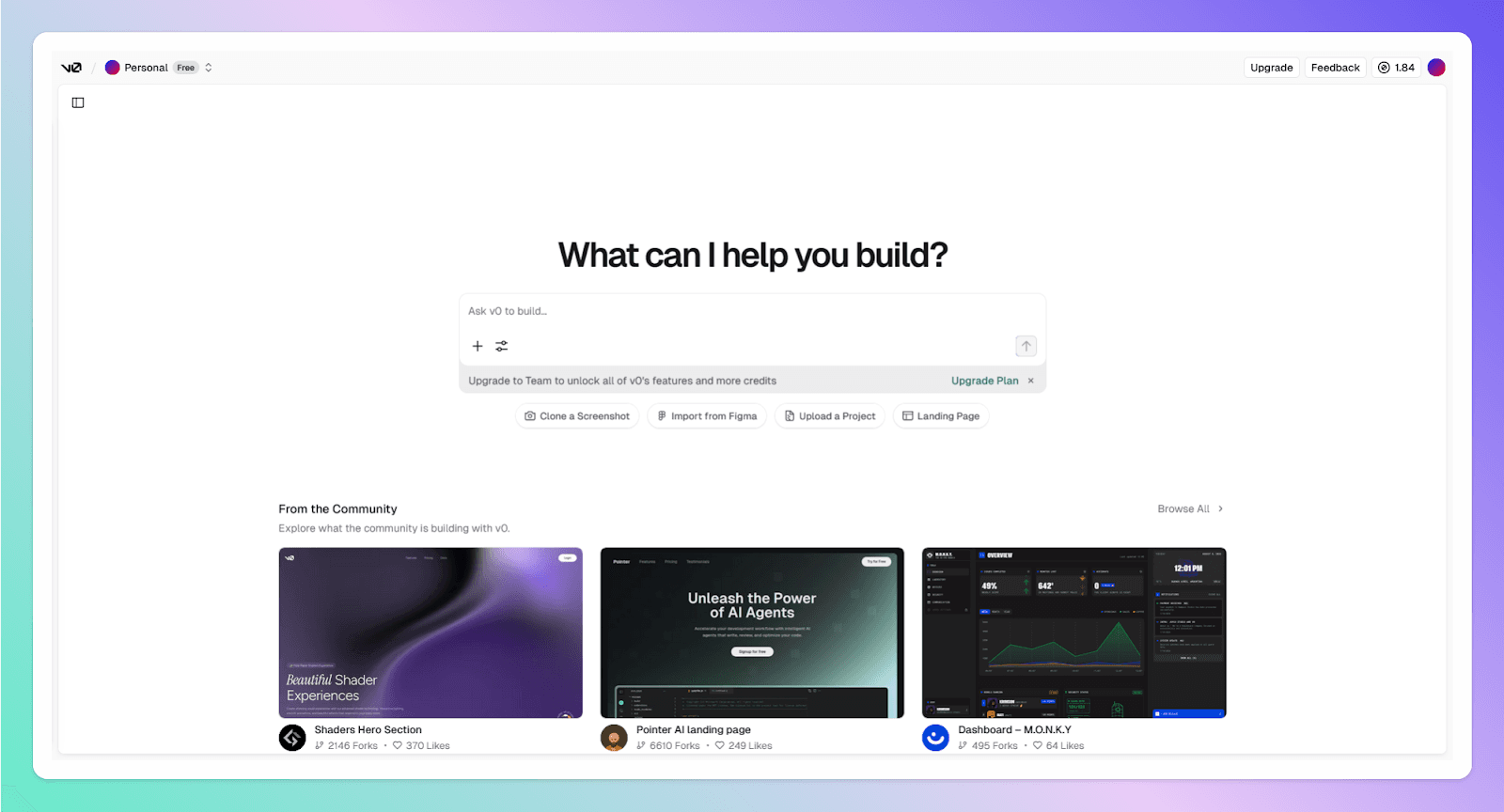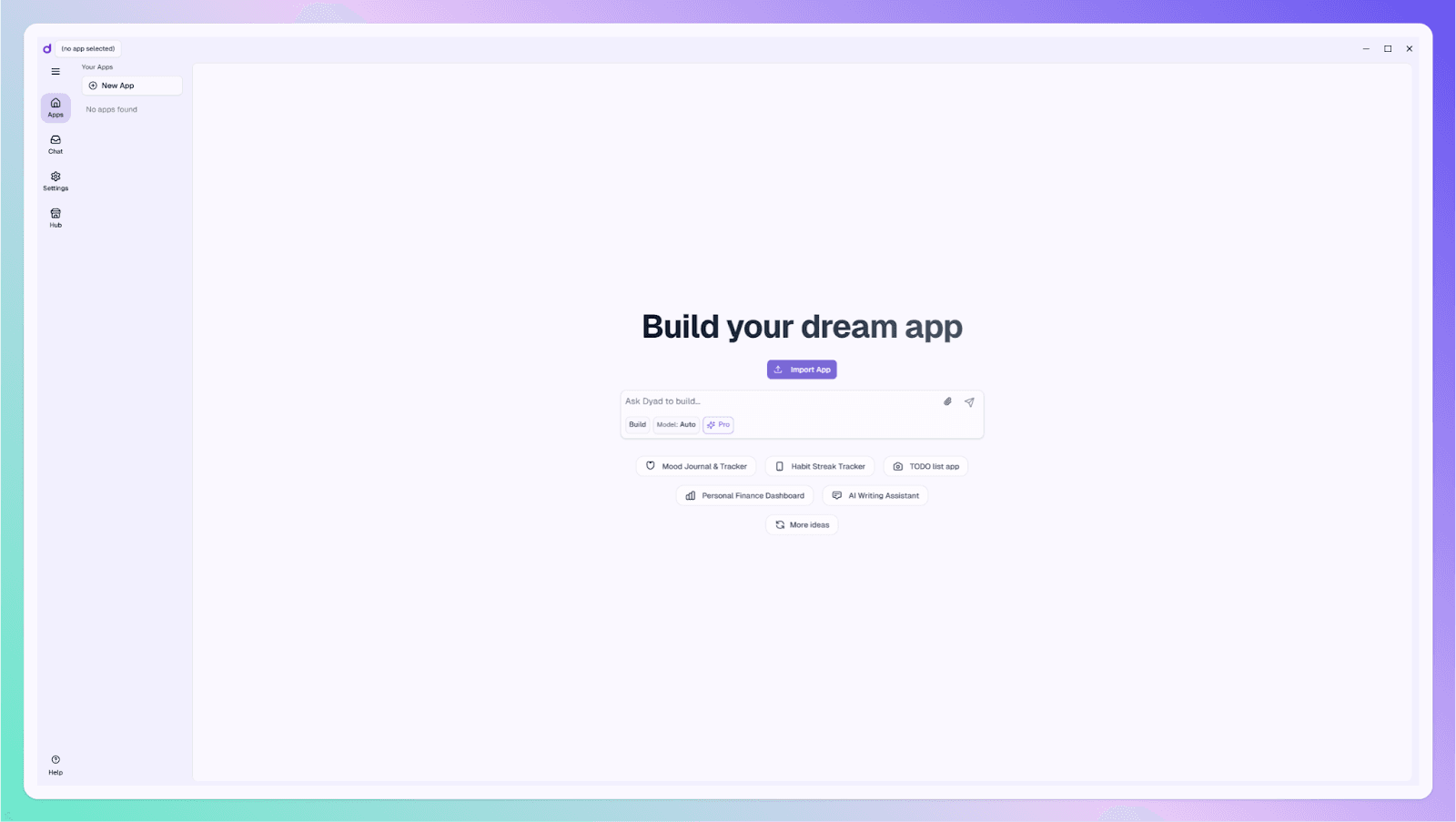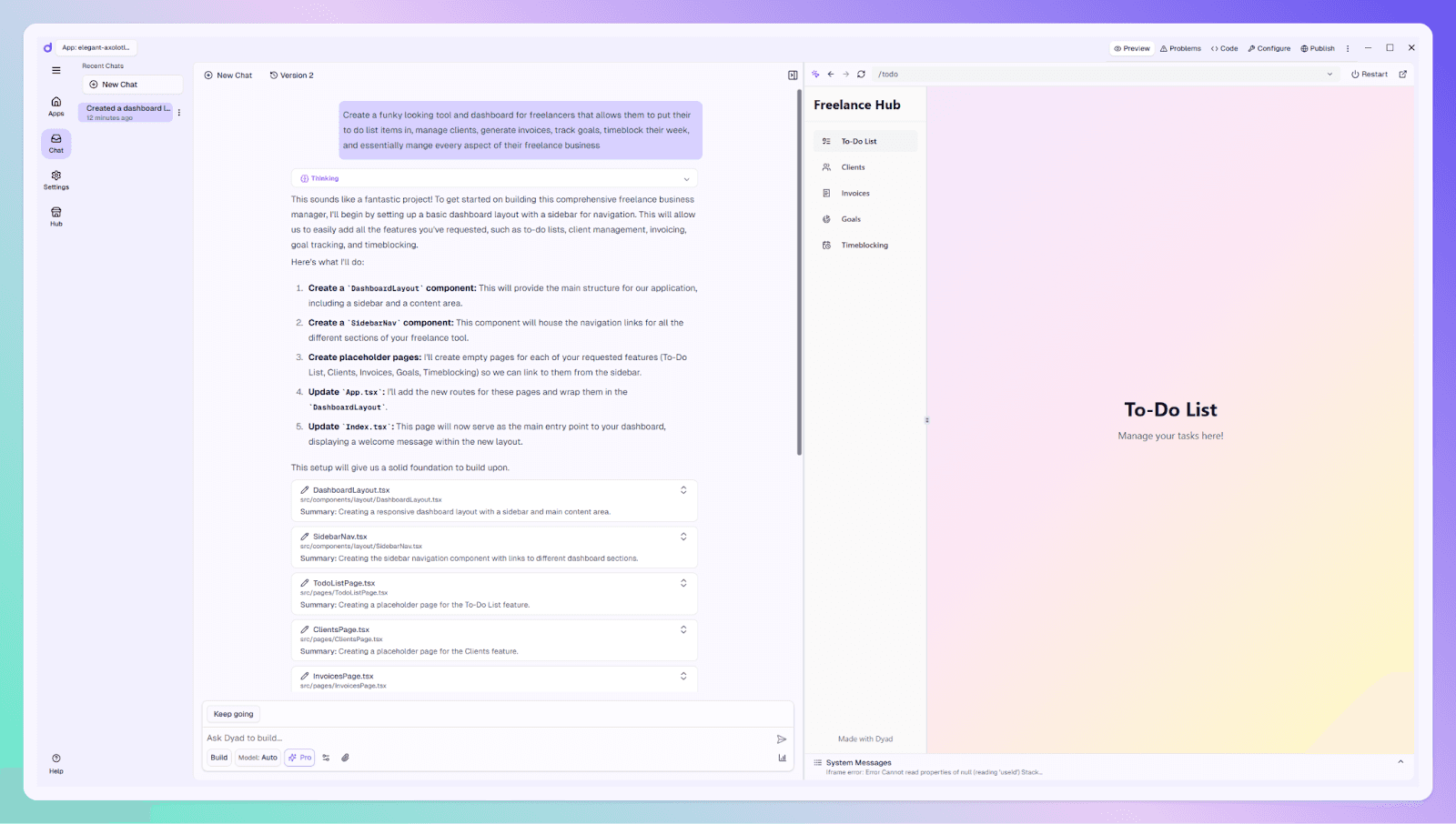The best v0 alternative - free, open‑source, local AI app builder
Building AI applications shouldn't be limited by the tools you use.
While Vercel's v0 has pioneered AI-powered development, many developers are discovering they need more flexibility than a cloud-based platform can provide. Whether it's choosing your preferred AI model, working with different frameworks beyond React, or maintaining complete control over your development environment, the limitations add up.
Dyad offers a different approach: a free, open-source, local alternative that puts you in control.
Instead of being locked into specific models or frameworks, Dyad lets you choose from GPT-5, Claude, Gemini (via your own API keys), or run completely free local models. You can work with React, Vue, Angular, or any framework your chosen AI model supports. Everything runs locally on your machine, giving you complete privacy and eliminating dependency on external services.
This guide compares both platforms honestly, so you can make the best choice for your specific needs and development style.
Download Dyad for free (no sign-up required)
Build apps by chatting with AI - no coding experience required
At a glance
| Attribute | Dyad | Vercel v0 |
|---|---|---|
| Architecture | Local-first desktop app | Cloud-based web app |
| Privacy | Runs on your machine; no data sharing | Processes on Vercel servers |
| AI models | Any model (BYOK) + free local models | Vercel-provided models only |
| Frameworks | React, Vue, Angular and more | Primarily React/Next.js |
| Pricing | Free (BYOK/local), optional Pro credits | Subscriptions + credit meter |
| Vendor lock-in | Open-source; portable projects | Tied to Vercel ecosystem |
What is v0 (and why consider an alternative?)

Vercel v0 is a cloud-based AI-powered UI generator that transforms natural language prompts into React components and full applications. Launched by Vercel in 2023, it's designed to accelerate frontend development by generating production-ready code using modern web technologies like React, Next.js, and Tailwind CSS.
v0 operates entirely in your browser through a chat-like interface. You describe what you want to build—“Create a dashboard for tracking crypto prices” or “Build a landing page for a SaaS product”—and v0 generates the code, shows you a live preview, and allows you to iterate through conversation. The platform integrates tightly with Vercel's hosting infrastructure, enabling one-click deployment of generated applications.
What v0 excels at:
- Generating polished React/Next.js components with modern styling
- Creating responsive, accessible user interfaces quickly
- Integrating with the broader Vercel ecosystem (hosting, analytics, edge functions)
- Converting design screenshots into functional code
- Rapid prototyping and client demos
What v0 isn't:
- Framework-agnostic (primarily focused on React/Next.js)
- A local development tool (requires internet connection)
- Privacy-focused (processing happens on Vercel's servers)
Why developers seek v0 alternatives
While v0 works well for React-focused teams, many developers need more flexibility than a cloud-based platform can provide. Common limitations include being locked into specific AI models, framework restrictions beyond React/Next.js, and lack of control over the development environment.
This is where alternatives like Dyad provide additional options—giving you the ability to choose any AI model, bring your own API keys, and build with your preferred frontend framework.
What is Dyad?

Dyad is a free, local, open-source AI app builder that runs entirely on your computer. Created as an alternative to cloud-based platforms like v0, Dyad gives developers complete control over their AI development environment while supporting multiple frameworks, AI models, and development workflows.
Unlike browser-based tools, Dyad is a desktop application that integrates with your existing development setup. You can use any AI model via your own API key—from GPT-5 and Claude to completely free local models via Ollama. All processing happens locally, ensuring privacy and eliminating dependency on external services. The platform is framework-agnostic, supporting React, Vue, Angular, and other modern web technologies based on your chosen AI model's capabilities.
What Dyad excels at:
- Flexibility to use any AI model or run models locally for free
- Multi-framework support beyond just React/Next.js
- Complete privacy with local processing and no data sharing
- Seamless integration with local development workflows (VS Code, Cursor, etc.)
- Open-source transparency and community-driven development
- Unlimited AI-powered development without usage restrictions
What Dyad isn't:
- A managed cloud service (requires local setup and maintenance)
- A hosting platform — Dyad lets you deploy anywhere, with integrated support for Vercel
The fundamental difference
The core distinction comes down to philosophy and architecture.
v0 represents the “software as a service” approach—optimized for immediate productivity with minimal setup, making it ideal for quick prototypes, client demos, or teams already committed to the Vercel ecosystem.
Dyad embodies the “own your tools” philosophy—invest slight setup effort for complete control, flexibility, and long-term value, making it better suited for serious development work, privacy-conscious projects, or teams wanting to avoid vendor lock-in.
Understanding these fundamental differences helps explain why certain features and limitations exist in each platform, and why the choice between them depends heavily on your specific needs, technical comfort level, and development philosophy.
Pricing: Flexibility vs fixed plans
Understanding the cost structure differences between v0 and Dyad helps explain why many developers are making the switch for budget predictability and control.
v0's credit-based system

v0 operates on a subscription model with included monthly credits:
- Free: $0/month with $5 in monthly credits
- Premium: $20/month with $20 in monthly credits
- Team: $30/month with $30 in monthly credits per user
After your monthly credits are used, additional usage costs $1.50 per million input tokens and $7.50 per million output tokens.
Dyad's flexible approach

Dyad offers a fundamentally different pricing philosophy with maximum flexibility:
- Dyad Free: Completely free with two options:
- Use your own API keys with any provider (OpenAI, Anthropic, Google)
- Run completely free local models via Ollama
- Dyad Pro: $20/month with 200 AI credits plus exclusive features
- Dyad Max: $79/month with 900 AI credits for complex applications
The power of choice: BYOK vs Dyad Credits
Bring Your Own Key (Free Option):
- Direct API access at provider rates (often cheaper than platform markups)
- Complete cost control and transparency
Completely free local models:
- Use popular local models via LM Studio and Ollama
- $0 per generation, unlimited usage
- Perfect for experimentation, learning, and budget-conscious development
Dyad Pro credits (Premium Option): While BYOK offers great value, Dyad Pro provides additional benefits many developers prefer:
- Exclusive Pro Modes: Smart Context and Turbo Edits optimize credit usage
- Hassle-free model access: Switch between GPT-5, Claude, and Gemini without juggling keys
- Predictable billing: Pay upfront for credits instead of surprise API bills
- Direct creator access: Office hours and product roadmap influence
- Premium learning content: Dyad Academy with 20+ instructional videos
Cost control through model choice
Budget optimization examples:
- Learning/Prototyping: Start with free API keys from Gemini and OpenRouter
- Development: Use your own API keys for cost-effective iterations
- Production/Complex Projects: Upgrade to Dyad Pro for optimized Pro modes and premium support
- Team Projects: Mix approaches based on project requirements
This flexibility means you're never locked into a single pricing model. Start free, scale with BYOK when needed, or upgrade to Pro for advanced features—all while maintaining complete control over your development costs.
Why local AI development is the future
Local AI development represents more than just a technical preference—it's a fundamental shift toward developer autonomy and workflow optimization. While cloud-based platforms like v0 offer convenience, they introduce dependencies and limitations that can constrain how you work. Local development with Dyad eliminates these barriers, giving you complete control over your development environment while integrating seamlessly with the tools and workflows you already use.
Seamless workflow integration

The biggest advantage of local AI development isn't speed—it's workflow integration. Dyad integrates seamlessly with your existing development environment: VS Code, Cursor, any IDE you prefer. Git workflows remain unchanged. Debugging happens in familiar tools. No context-switching between browser interfaces and your development environment.
This integration becomes powerful when combined with other development tools. Many Dyad users report using it alongside their existing coding assistants. Instead of disrupting your established process, Dyad enhances it by bringing AI capabilities directly into your local environment.
Freedom from vendor lock-in
v0 locks you into Vercel's AI models with no alternatives. Bad generation results? You're limited to whatever model Vercel provides. With Dyad, you can switch between GPT-5, Claude, Gemini, or local models based on what works best for your specific task.

Beyond model choice, v0 creates broader dependencies. You're bound to their pricing changes and service decisions.
With Dyad's open-source approach, you control your tools. If you need to modify functionality or migrate to different infrastructure, you can do so without losing your development investment.
Which AI app builder should you choose?
The decision depends on your priorities, technical requirements, and working style. Here's an honest comparison to help you decide:
Choose v0 if you:
- Live in the React/Next.js ecosystem and build primarily with Vercel's stack
- Want immediate results with zero setup—just open a browser and start building
- Prefer managed services and want someone else handling AI model updates and maintenance
- Work on projects where code privacy isn't a primary concern
v0 excels at: One-click Vercel deployment and seamless ecosystem integration, rapid React prototyping, and professional styling out of the box.
Choose Dyad if you:
- Value model flexibility—choose GPT-5, Claude, Gemini, or free local models for each task
- Need privacy control for client work, proprietary projects, or sensitive data
- Work with multiple frameworks beyond React/Next.js
- Prefer local development with seamless IDE integration (VS Code, Cursor, etc.)
- Support open source and want to avoid vendor lock-in
Dyad excels at: Complete development freedom, cost predictability, framework flexibility, and integration with your existing workflow tools.
The bottom line
Consider Dyad when: you want to run things locally, you're working with sensitive data, or you use diverse technology stacks. The ability to standardize on one tool across different frameworks and projects simplifies tooling.
Consider v0 when: You need to ship React prototypes quickly, you're already invested in the Vercel ecosystem, and you prefer the simplicity of a managed service over local setup.
How to get started with Dyad (and get the best experience)
Consider Dyad the better option for you? You can be up and running in as little as a few minutes.
Here's how:
- Visit the Dyad homepage and download for your platform (macOS, Windows, Linux)
- No account required, no credit card needed
- Choose your AI model: Start with Gemini or OpenRouter for free or any other model you like
- Start building: The interface feels familiar to v0 but with more customization options

Don't forget to check out the community resources along the way:
- r/dyadbuilders on Reddit for real-world examples and tips by the community
- Docs from basic setup to advanced customization
- GitHub issues for bug reports and feature requests
The future belongs to open, local AI development
Local AI development isn't a trend—it's the inevitable response to developer demand for autonomy and control. Dyad represents a fundamentally different philosophy: Own your tools instead of renting them. Choose your AI models instead of accepting whatever a platform provides. Build on open standards instead of proprietary lock-in.
Ready to experience AI development without limits?
Download Dyad free from the Dyad homepage and build without vendor lock-in.
Download Dyad for free (no sign-up required)
Build apps by chatting with AI - no coding experience required